SECURITIES AND EXCHANGE
COMMISSION
WASHINGTON, D.C. 20549
FORM 6-K
REPORT OF
FOREIGN PRIVATE ISSUER
Pursuant to Rule 13a-16 or 15d-16 OF
THE SECURITIES EXCHANGE Act of 1934
For the month of November 2015
ORIX
Corporation
(Translation of Registrant’s Name into English)
World Trade Center Bldg., 2-4-1 Hamamatsu-cho, Minato-Ku, Tokyo, JAPAN
(Address of Principal Executive Offices)
(Indicate by check mark whether the registrant files or will file annual reports under cover of Form 20-F or Form 40-F.)
Form 20-F x Form 40-F ¨
(Indicate by check mark whether the registrant by furnishing the
information contained in this form is also thereby furnishing the information to the Commission pursuant to Rule 12g3-2(b) under the Securities Exchange Act of 1934.)
Yes ¨ No x
Table of Documents Filed
SIGNATURES
Pursuant to the requirements of the Securities Exchange Act of 1934, the registrant has duly caused this report to be signed on its behalf by the undersigned, thereunto duly authorized.
|
|
|
|
|
|
|
ORIX Corporation |
|
|
|
| Date: November 10, 2015 |
|
By |
|
/s/ Masaaki Kawano |
|
|
|
|
Masaaki Kawano |
|
|
|
|
Exective Officer |
|
|
|
|
Special Assistant to CFO |
|
|
|
|
ORIX Corporation |
ORIX Corporation
VINCI Airports S.A.S.
Announcement Regarding
the Selection of Preferred Negotiation Right Holder in the Qualified Project Etc. for Airport Operation of both Kansai International Airport and Osaka (Itami) International Airport
Tokyo Japan - November 10, 2015 - ORIX Corporation (“ORIX”) and VINCI Airports S.A.S (“VINCI Airports”), both being the core companies
of the consortium (the “Consortium”), announced that the Consortium has been selected as a preferred negotiation right holder in the selection procedures for the operating right holder in the “Qualified Project Etc. for Airport
Operation of Kansai International Airport and Osaka International Airport” (the “Project”) implemented by New Kansai International Airport Company, Ltd. (“NKIAC”) as of November 10, 2015.
| 1. |
Background of the selection of the Consortium as a preferred negotiation right holder and the schedule going forward |
NKIAC of which the Japanese government holds 100% of the shares, is implementing the selection procedures for operating right holder in the Project being
implemented by NKIAC pursuant to the Act on Promotion of Private Finance Initiative and the Act for Integrated and Efficient Establishment and Administration of Kansai International Airport and Osaka International Airport.
On June 12, 2015, the Consortium passed the first screening concerning the selection of the preferred negotiation right holder of the Project, and it
submitted the document for the second screening on September 18, 2015, and subsequently it was selected as a preferred negotiation right holder by NKIAC on November 10, 2015. ORIX and VINCI Airports plan to execute the Basic Agreement on
the Project with NKIAC, together with the other corporations in the Consortium, during November. Thereafter, the joint venture company (the “Concessionaire”) will be incorporated in December. Once NKIAC has granted it the operating right
regarding the Project pursuant to the Basic Agreement, the Concessionaire plans to execute the Agreement Concerning the Implementation of the Right to Operate Public Facilities Etc. (the “Project Agreement”) with NKIAC, and to start
operating the two airports as concessionaire on April 1, 2016.
(1) Basic outline
The Project period is scheduled to be 44 years, from April 1, 2016 to March 31, 2060. In the Project, NKIAC and Kansai International Airport Land
Company, Ltd. (“KIALC”) will continue to own the airport site and facilities. The Concessionaire will be granted the operating right from NKIAC pursuant to the “Act on Promotion of Private Finance Initiative,” and will engage in
the operation of both the aviation-related businesses (operation and maintenance and management of runways, etc.) and non-aviation-related businesses (operation and maintenance and management of terminal buildings, etc.) of Kansai International
Airport and Osaka International Airport. In principle, the losses and profits from the Project will belong to the Concessionaire. However, the aviation control business, customs, immigration control and quarantine businesses and railway business
conducted by NKIAC are outside the scope of the business of the Concessionaire.
Pursuant to the Project Agreement, as of the commencement of the Project,
the Concessionaire plans to pay to NKIAC, a performance guarantee deposit, a consideration for the acquisition of shares in the subsidiaries transferred from NKIAC to the Concessionaire and a consideration for movables also transferred from NKIAC.
Also, during the period of the Project, the Concessionaire plans to pay to NKIAC a fixed concession fee or “consideration for the operating right”, variable concession fee based on revenues or “revenue sharing fee” and additional
fees to cover certain costs borne by NKIAC and KIALC (such as fixed asset tax).
1
As one of the largest Japanese companies in financial services, ORIX will provide its expertise of management
planning, finance, personnel affairs, compliance and non-aviation marketing divisions. Also, ORIX will strive to have good dialogue with the state and local governments, Kansai business communities and neighboring residents, and while maintaining
the balance between strength of originality, innovation, and dynamism of a private corporation and the social responsibility of operating a public infrastructure, and contribute to the continuous development of both airports. In addition, by
utilizing ORIX group’s experience of commercial facility development and operation businesses, knowhow and network of business connections, ORIX will strive to expand the operational revenue of the terminals together with VINCI Airport’s
total coordination of the facility.
As a reputable airport operator with a global track record, VINCI Airports will take the leading role and be in
charge of the daily airport operation, aviation marketing, commercial marketing, technology and safety promotion divisions, and while maintaining safety and airport functions, and ultimately strengthen the airports’ efficiency and international
competitiveness. VINCI Airports will strive to draw out both airports’ potential and to expand aviation demand and enhance profitability through its knowhow on efficient airport operations and business relationships with airline companies, and
integrated marketing enhancement over aviation sales and terminal sales.
(Reference) Outline of the structure of the Project
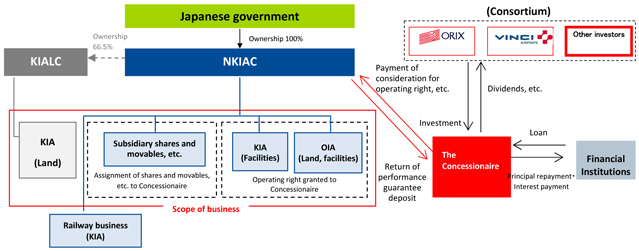
| * |
KIA = Kansai International Airport |
| * |
OIA = Osaka International Airport |
2
(2) Outline of the Concessionaire (as of the time of incorporation)
|
|
|
|
|
| (1) |
|
Name |
|
TBD |
| (2) |
|
Head Office |
|
TBD |
| (3) |
|
Title and name of representative |
|
TBD |
| (4) |
|
Details of the business |
|
Operation and management services, etc. of Kansai International Airport and Osaka International Airport |
| (5) |
|
Capital |
|
1,250 million yen (planned) |
| (6) |
|
Date of incorporation |
|
December, 2015 (planned) |
| (7) |
|
Fiscal year end |
|
End of March (planned) |
| (8) |
|
Net assets |
|
2,500 million yen (planned) |
| (9) |
|
Total assets |
|
2,500 million yen (planned) |
| (10) |
|
Shareholding ratio |
|
ORIX: 50%, VINCI Airports: 50% (planned) (Note1) |
|
|
|
| (Note1) |
|
The Concessionaire will increase its capital by way of third-party allotment of new shares to ORIX and VINCI Airports and other
investors scheduled by the time of commencement of the Project. |
(3) Performance outlook of the Concessionaire
|
|
|
|
|
|
|
|
|
|
|
|
|
|
|
|
|
| Accounting period |
|
FY2016.3 |
|
|
FY2017.3 |
|
|
FY2018.3 |
|
|
FY2019.3 |
|
| Total assets
(million yen) |
|
|
260,000 |
|
|
|
1,710,481 |
|
|
|
1,681,154 |
|
|
|
1,649,564 |
|
| Operating revenues
(million yen) |
|
|
—
(Note 1 |
) |
|
|
168,491 |
|
|
|
172,295 |
|
|
|
178,915 |
|
|
|
|
| (Note 1) |
|
Since the Concessionaire will start conducting business April 1, 2016, Operating revenues of the first fiscal year (the period ending March 2016) of the Concessionaire are not stated above. |
| (Note 2) |
|
These performance figures, etc., are future predictions based on judgments and assumptions using currently available information. The actual business results may be different from the forecasts stated above due to various factors,
such as variation of risk or uncertain factors, or changes, etc. of the economic situations. |
| 3. |
Management vision and management mission of the Concessionaire |
(1) Management vision
The Concessionaire aims to achieve the recognition as the leading company in the airline industry in the Asia-Pacific region, and it also aims
to be a world-class airport operator by creating a new model for airport operations.
(2) Management mission
| |
• |
|
Security and safety are the first priority of the airport operations. |
| |
• |
|
Obtain the highest customer satisfaction by swift operation and customer service utilizing a wealth of experience. |
| |
• |
|
Contribute to the development of the local community and economy through smooth airport operations. |
| |
• |
|
Become the symbol of Japanese and Kansai culture and industry, and promote their attractiveness to the world. |
| |
• |
|
Continue to be an environmental-friendly airport working in harmony with local society. |
| |
• |
|
Develop world-class specialized human resources and create a culture in which employees share feelings of joy and pride in their work. |
3
| 4. |
Project implementation structure |
(1) Shareholding structure of the Concessionaire
The shareholding structure of the Concessionaire, at the time the Project commences, is planned as below.
|
|
|
|
|
| Company |
|
Address |
|
Shareholding |
| ORIX |
|
2-4-1, Hamamatsucho, Minato-ku, Tokyo, Japan |
|
Representative company 40% |
| VINCI Airports |
|
12-24 rue Louis Blériot 92500 –
Rueil-Malmaison, France |
|
Operator 40% |
| Other shareholders |
|
— |
|
Total 20% |
Thirty companies other than ORIX and VINCI Airports, mainly companies based in Kansai and financial institutions, are the
prospective investors which will finalize their investment decision by the time the Concessionaire is incorporated.
The prospective investors of the
Concessionaire are as below:
ASICS Corporation; Iwatani Corporation; Osaka Gas Co., Ltd.; Obayashi Corporation; OMRON Corporation; The Kansai Electric
Power Company, Incorporated; Kintetsu Group Holding Co., Ltd.; Keihan Electric Railway Co., Ltd.; Suntory Holdings Limited; JTB Corp.; Sekisui House, Ltd.; Daikin Industries, Ltd.; Daiwa House Industry Co., Ltd.; Takenaka Corporation; Nankai
Electric Railway Co., Ltd.; NIPPON TELEGRAPH AND TELEPHONE WEST CORPORATION; Panasonic Corporation; Hankyu Hanshin Holdings, Inc.; Rengo Co., Ltd.; The Senshu Ikeda Bank, Ltd.; Kiyo Holdings, Inc.; The Bank of Kyoto, Ltd.; THE SHIGA BANK, LTD.; The
Nanto Bank, Ltd.; Nippon Life Insurance Company; Mizuho Bank, Ltd.; Sumitomo Mitsui Trust Bank, Limited; The Bank of Tokyo-Mitsubishi UFJ Ltd.; Resona Bank, Limited; and the Private Finance Initiative Promotion Corporation of Japan.
ORIX (as the representative company) and VINCI Airports (as the airport operator) both hold the largest voting right ratio of the Concessionaire, and they
will retain the majority of voting rights in the aggregate of their shares, as equal partners.
(2) Establishment and structure of the Concessionaire
In carrying out the Project, ORIX and VINCI Airports will together establish the Concessionaire in which the Consortium will use it as a vehicle in
making equity injection into the Project. It is planned that the Concessionaire will be a joint stock company established under and governed by the laws of Japan.
ORIX and VINCI Airports will each dispatch a representative director and CEO (Shacho), and a representative director and Co-CEO (Fuku shacho).
4
(3) Funding
By the time the Project commences, the Concessionaire plans to fund the Project through means and the structures as following, in order to sustainably deliver
stable management and operations of, and to implement appropriate capital investments in, and maintenance and administration of both airports over the long run, as follows:
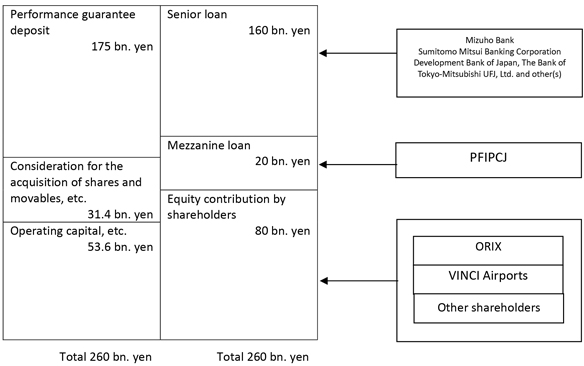
The amount of funding necessary as of the commencement of operations is expected to be 260 billion yen, of which 80 billion
yen (or approximately 30% of the necessary amount of funds) is planned to be contributed by ORIX, VINCI Airports, and other shareholders.
Regarding
external debt financing, given that the period of the Project is 44 years, the senior loan with tenor of 30 years will be secured. Furthermore, the mezzanine loan to be provided by PFIPCJ will additionally secure super-long term funding with a
35-year period of maturity.
5
| 5. |
Concession Fee and other Payments to NKIAC |
In operating the Project, the Concessionaire plans to pay to
NKIAC: a performance guarantee deposit, a consideration for the acquisition of shares in the subsidiaries transferred from NKIAC to the Concessionaire and a consideration for movables also transferred from NKIAC. In addition, during the period of
the Project, the Concessionaire plans to pay to NKIAC a fixed concession fee or “consideration for the operation right”, a variable concession fee based on revenues or “revenues sharing fee” and additional fees to cover certain
costs borne by NKIAC and KIALC (such as fixed asset tax).
|
|
|
|
|
| (i) |
|
Performance guarantee deposit |
|
175,000,000,100 yen (performance guarantee
deposit will be returned during the project period and a total of 56 billion yen will be returned over the initial five (5) years) |
|
|
|
| (ii) |
|
Consideration for assets to be transferred to the Concessionaire (Consideration for the acquisition of shares and movables, etc.) |
|
31,400,000,000 yen |
|
|
|
| (iii) |
|
Consideration for the operating right |
|
37,275,000,000 yen per annum |
|
|
|
| (iv) |
|
Revenue sharing fees |
|
3% of the applicable revenue of every fiscal year that exceeds 150 billion yen
(with a cap attached, which limits the fee payment up to a certain level of cash flow attributable to the shareholders of the Concessionaire) |
| 6. |
Project Implementation Policies |
(1) Aviation-related business
Along with the expectation that passenger demand in Japan will steadily expand in the future, further diversification of the types of outbound
travelers, increases in repeat travelers, and the emergence of new website services for overseas travels, etc. are also anticipated. Similarly, in order to respond to passengers’ needs, services provided by airlines are expected to change
significantly, with the rise of LCCs. Kansai International Airport succeeded in attracting LCCs by seizing opportunities for increased demand and achieved growth through construction of a broad network in the Asian bloc. The Concessionaire aims to
maximize business opportunities through further enhancement of marketing functions while succeeding NKIAC’s legacies to date, in light of further needs for diversification in the future. The Concessionaire aims to position the two airports to
function as flagship for future Kansai tourism and other industry development, and to contribute to the region.
With regards to marketing
activities towards airlines, airport users, etc., the Concessionaire will not only seek to increase opportunities for direct communication, but also make appropriate capital investments in airport facilities. In consideration of the competitive
environment with other airports and other modes of transportation, the Concessionaire aims to maintain and enhance the capabilities and competitiveness of Kansai International Airport and Osaka International Airport. Regarding the implementation of
airport marketing, engagements together with various stakeholders and regions involved in tourism in Kansai will be promoted. Through active information sharing on tourism and airline industries with relevant agencies, etc., the Concessionaire will
recognize the current issues, and implement appropriate measures to increase the number of airport users.
6
(2) Non-aviation-related business
The Concessionaire recognizes that the airport is a gateway to the region and that it can provide value embodying characteristics of the Kansai
region and Japan. The Concessionaire will aim to implement measures to promote the use of the airport facilities, and contribute to the development of regional businesses and tourism in Kansai. Through these efforts, the Concessionaire will aim to
create new business opportunities, by fully utilizing its own expertise from the private sector and maximize the potential of the existing facilities and the surrounding region. Both airports have its own characteristics, with the Kansai
International Airport expected to benefit from increasing inbound tourists, and the Osaka International Airport which is expected to have stable demand of mainly business users due to its proximity to urban areas.
In addition, acknowledging the fact that the airports need to fulfill the wide variety of demands from all users including, travelers and their
friends and families, airlines staffs, and other staffs of the facilities, etc., the Concessionaire will aim to improve convenience and comfort of the facility for these users and increase the operational revenue of the non-aviation-related business
by optimizing all operations from the arrival and boarding of the travelers down to the parking and accommodations.
For the efficiency of
the entire airport, it is essential to introduce comprehensive measures governing the entire process. The Concessionaire will implement measures in three main areas: (i) boarding procedures optimization, (ii) layout reform and
(iii) store configuration optimization.
In the actual implementation of various measures, existing procedures established by NKIAC
will be considered, and appropriate adjustments based on the actual external business environment, timing of the implementation and staff input, will be made. Also, after the introduction of measures, efforts to stabilize and maximize the effects of
the measures will be continued.
(3) Safety, Environmental Measures and Regional Co-existence
Considering that the Project is the first full-scale airport privatization project in Japan, the Concessionaire will cooperate with various
stakeholders such as local governments, companies and residents in the region from the early stages of the operation, and build favorable relationships. In addition, advanced, world-class environmental measures will be introduced, and the
Concessionaire will actively engage in airport operations while considering needs of the local community at all time.
The Consortium
understands the important of the two airports as being a control center of people flow and material logistics, while being a public infrastructure of the country, and will focus on strengthening the safety functions, including security system and
maintenance and operation management of the facilities. The Consortium intends to take all possible measures to secure safety and security of the airport users and employees engaged in the airport operation by creating a plan for safety management,
and by maintaining the appropriate implementation system, in addition to building a solid compliance system, etc. and all together guarantee the existing safety levels.
7
The Consortium strongly recognizes that Kansai International Airport and Osaka International
Airport are public infrastructures bearing extremely important roles in revitalizing Kansai’s economy, as well as being a part of the surrounding regional society. The Concessionaire will introduce measures which will enable both airports to
contribute to the region’s “Creation of Activity (Nigiwai Soushutsu)” and “Education, Culture, and Exchange (Kyoiku Bunka Koryu),” become the bases for new exchanges for people in the region, and contribute to
the Kansai economy overall.
In addition to implementing regulatory noise reduction measures, the Concessionaire will continue the
environmental friendly initiatives such as the “Smart Island Promotion Plan (Smart “Ai” land Promotion Plan),” “Eco Airport Promotion Plan,” and others, which are currently being implemented by NKIAC. The
Concessionaire, while maintaining NKIAC’s current high standards, will aim for further enhancement of environmental control standards by fully utilizing the experience and knowledge held by VINCI Airports and ORIX group.
8
| 7. |
Outline of VINCI Airports |
|
|
|
|
|
|
|
|
|
| (1) |
|
Name |
|
VINCI Airports S.A.S. |
| (2) |
|
Location |
|
12-14 rue Louis Blériot
92500 Rueil Malmaison, France |
| (3) |
|
Title and name of representative |
|
Nicolas NOTEBAERT Chairman of
VINCI Airports |
| (4) |
|
Business outline |
|
Development, operation and management of airports |
| (5) |
|
Capital |
|
389 million euro as of the end of December, 2014 |
| (6) |
|
Date of incorporation |
|
November 1st 1996 |
| (7) |
|
Major shareholders and shareholding ratio |
|
100% VINCI group |
| (8) |
|
Relationship between ORIX and VINCI Airports S.A.S. |
|
Capital relationship |
|
There is no capital relationship to be stated between ORIX and VINCI Airports S.A.S. |
| |
|
Personal relationship |
|
There is no personal relationship to be stated between ORIX and VINCI Airports S.A.S. |
| |
|
Transactional relationship |
|
There is no transactional relationship to be stated between ORIX and VINCI Airports S.A.S. |
| |
|
Status of applicability under related parties |
|
VINCI airports S.A.S. does not fall under the category of ORIX’s related parties. |
| (9) |
|
Consolidated operating results and consolidated financial conditions for the last three years of VINCI Airports S.A.S. (Unit: millions of euro) |
|
|
|
|
|
|
|
|
|
|
|
|
|
| Accounting period |
|
FY2012.12 |
|
|
FY2013.12 |
|
|
FY2014.12 |
|
| Consolidated net assets |
|
|
172 |
|
|
|
570 |
|
|
|
677 |
|
| Consolidated total assets |
|
|
304 |
|
|
|
4,037 |
|
|
|
4,300 |
|
| Consolidated net assets per share |
|
|
n/a |
|
|
|
n/a |
|
|
|
n/a |
|
| Consolidated sales |
|
|
86 |
|
|
|
221 |
|
|
|
621 |
|
| Consolidated operating profit |
|
|
17 |
|
|
|
147 |
|
|
|
205 |
|
| Consolidated ordinary profit |
|
|
11 |
|
|
|
115 |
|
|
|
91 |
|
| Current net profit attributed to parent company’s shareholders |
|
|
9 |
|
|
|
114 |
|
|
|
88 |
|
| Consolidated current net profit per share |
|
|
n/a |
|
|
|
n/a |
|
|
|
n/a |
|
| Dividend per share |
|
|
n/a |
|
|
|
n/a |
|
|
|
n/a |
|
| (Note 1) |
Consolidated net assets per share, Consolidated current net profit per share and Dividend per share are not described in the above table as VINCI Airports S.A.S. is not a listed company. |
| 8. |
Future schedule (tentative) |
|
|
|
|
|
| (1) |
|
Execution date of the Basic Agreement |
|
November 2015 |
| (2) |
|
Date of incorporation of joint venture company (Concessionaire) |
|
December 2015 |
| (3) |
|
Execution date of the Project Agreement |
|
December 2015 |
| (4) |
|
Commencement date of the Project by Concessionaire |
|
April 1, 2016 |
| 9. |
Impact on ORIX’s future consolidated financial results |
Since the Project will start April 1,
2016, its impacts on the consolidated performance of ORIX for the fiscal year ending March 2016 will be minor. In addition, the effects on the consolidated financial results of ORIX for the period ending March 2017 cannot be determined at this time.
9
Contact information:
ORIX Corporation
Corporate Planning Department
Tel:+81-3-3435-3121
Edelman Japan (Corporate communication
agency of VINCI Airports in Japan)
Tel:+81-3-4360-9000]
About ORIX:
ORIX Corporation (TSE: 8591; NYSE: IX) is a
financial services group which provides innovative products and services to its customers by constantly pursuing new businesses. Established in 1964, from its start in the leasing business, ORIX has advanced into neighboring fields and at present
has expanded into the lending, investment, life insurance, banking, asset management, automobile-related, real estate and environment and energy-related businesses. Since its first overseas expansion into Hong Kong in 1971, ORIX has spread its
business globally by establishing locations in a total of 36 countries and regions across the world. Moving forward, ORIX aims to contribute to society while continuing to capture new business opportunities. For more details, please visit our
website: http://www.orix.co.jp/grp/en/
Caution Concerning Forward Looking Statements:
These documents may contain forward-looking statements about expected future events and financial results that involve risks and uncertainties. Such statements
are based on our current expectations and are subject to uncertainties and risks that could cause actual results to differ materially from those described in the forward-looking statements. Factors that could cause such a difference include, but are
not limited to, those described under “Risk Factors” in the Company’s annual report on Form 20-F filed with the United States Securities and Exchange Commission and under “4. Risk Factors” of the “Summary of
Consolidated Financial Results” of the “Consolidated Financial Results April 1, 2014 – March 31, 2015.”
10
APPENDIX: More about VINCI Airports
Key figures:
| |
• |
|
3 continents: Europe, Asia, South America |
| |
• |
|
+ 47 million passengers in 2014 |
| |
• |
|
717 million euros of revenues in 2014 |
| |
• |
|
8% shareholding in ADP (Aéroports de Paris) |
VINCI Airports, subsidiary of the French group VINCI, is
an emerging leader in the international airport sector. VINCI Airports manages the development and operations of 25 airports: 11 in France, 10 in Portugal (including the hub of Lisbon with 18 million passengers) 3 in Cambodia, and 1 in Chile.
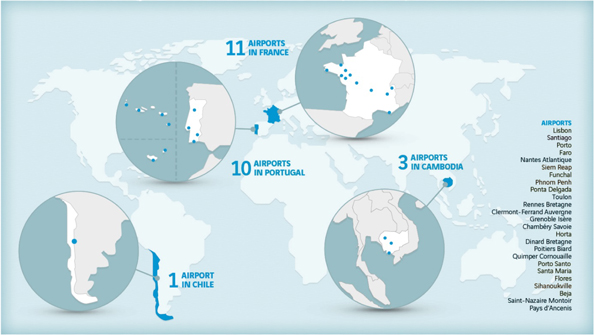
Its network of airports, served by more than 100 airlines, handles 47 million passengers annually
(2014) generating revenues of more than 717 million euros in 2014.
Through its expertise as a comprehensive integrator and the professionalism
of its 5,400 employees, VINCI Airports develops, finances, builds and operates airports, leveraging its investment capability, international network and know-how to optimize management of existing airport infrastructure, facility extensions and new
construction.
In early 2015 VINCI Airports, Aéroports de Paris and Astaldi, grouped together within the consortium Nuevo Pudahuel, were selected
by the Chilean government for the concession granted for Santiago de Chile’s Arturo-Merino-Benítez International Airport, the 6th largest airport in South America with 16.1 million passengers served in 2014, including about 50% of
international passengers. Since October 1, 2015, they have been operating the airport, for a period of 20 years.
11
WORKING IN PARTNERSHIP WITH THE AIRPORTS REGIONS, FOR THE LONG TERM
VINCI Airports commits for the long term with each airport, big or small, to be a driver in the development of its region. Its conviction: an airport’s
success depends on seeking shared values with its stakeholders.
VINCI Airports is unique in its market in being both an operator and an
investor-concession holder committed to supporting the delegating authority over the long term, for several decades. Conscious of the role an airport can play in opening the economy, increasing visibility and creating jobs in its region, VINCI
Airports works to develop each airport, according to its potential and in partnership with the delegating authorities.
The development of the airport and
its ecosystem are intrinsically linked.
VINCI Airports seeks harmonious and balanced relations with each airport’s stakeholders: delegating
authorities, airport suppliers, airlines, tourism entities (offices, agencies, tour operators, hotels), distributors, on-site airport companies, associations and the public.
VINCI Airports also works to implement best management practices in human resources and social dialogue with operating teams, and promotes job placement
programs as part of the agreements between its subsidiaries and airport delegating authorities. Consistent with its profession, the company participates in civic actions.
All airports are different and each region is unique. VINCI Airports develops an approach at each site customized for specific characteristics such as the
nature of the traffic and the economic development opportunities around the airport. The emphasis is on each region’s needs: VINCI Airports frequently invites local stakeholders to serve on advisory committees, relying on them to design new
initiatives.
Whenever a new route opens at an airport, it works with tourism officials to support the traffic. Airports may also provide opportunities to
promote local attractions.
VINCI Airports believes in the long term potential of Kansai and Japan: the company has been working for 2 years on the offer
for Kansai airports, mobilizing more than 30 experts. VINCI Airports has opened this year an office in Tokyo to manage this project.
12
A PROVEN EXPERIENCE IN HARMONIOUS INTEGRATION
VINCI Airports was selected in 2012 by the Portuguese government to acquire ANA, the operating company for 50 years of 10 airports in Portugal. VINCI Airports
reassured the public authority and the public regarding its social commitment and interest in managing a harmonious transition. Since VINCI Airports took over the management responsibilities, Portuguese airports have experienced strong growth in
traffic (+9.5 in 2014, including +13.3% at Lisbon Airport).
A 20 YEAR PRESENCE IN ASIA
In Cambodia, VINCI Airports has been present since 1995, operating the three airports in Phnom Penh, Siem Reap in the Angkor region and Sihanoukville, through
its subsidiary Cambodia Airports. These airports play a vital role in the country’s tourism development and economy, including through increasingly numerous connections with large Asian cities. VINCI Airports works with local tourism and
economic authorities to organize roadshows in Indonesia and India. Connections continue to be developed with China through the opening of routes to Chonqing and Xiamen.
The Cambodian airports continued their growth in 2014, with overall traffic increasing to 12.8%. From a social, societal and environmental perspective, VINCI
Airports operates in Cambodia according to the highest international standards. VINCI Airports is also associated with the Cambodian government in the company Artisans d’Angkor, which has breathed new life into traditional Khmer craft by
training and employing artisans under good conditions and providing outlets for their production. The extensions of the Phnom Penh and Siem Reap airports currently underway include works by local artisans.
VINCI Airports Academy:
As part of its commitment to
providing opportunities for employees at each of its facilities to develop their skills, the company launched VINCI Airports Academy in 2013. In joining VINCI Airports, employees benefit from new prospects for career development and professional
fulfillment. The company also encourages exchanges of expertise and best practices within its network. For example, the acquisition of ANA in Portugal and its consulting office further strengthened VINCI Airports’ technical expertise in airport
project management. These skills are needed in various investment projects, such as the work currently underway in Cambodia. A team of specialists was also assembled in 2014 to finalize the turnkey delivery of the new international terminal at
Dushanbe and ensure its successful startup. Several such exchanges have already occurred between France, Cambodia and Portugal
13
DEVELOPING TRAFFIC:
A PROACTIVE POLICY CONSISTENT WITH AIRLINE COMPANY EXPECTATIONS
VINCI Airports works in close collaboration with many airlines, continually offering them the best development opportunities identified throughout its airport
network. Its advance and accurate traffic forecasting methodology and proactive approach help produce results for partners in terms of traffic growth well beyond market trends.
|
|
|
| Developing traffic is a key skill in airport operations. VINCI Airports’ decentralized approach puts airlines in direct contact with the
marketing departments and teams of the different airports in order to provide them with the most relevant information in each local market. Each airport also enables its airline partners to benefit from links established with the surrounding tourism
and economic ecosystem. VINCI Airports marketing teams rely on its center of
expertise, which summarizes data, establishes benchmarks and disseminates best practices. Operating through the company’s network enables the expansion of all airport sizes to be simulated because it provides a vision of the whole similar to
that of an airline: VINCI Airports is thus able to identify which of the many options are the best opportunities for creating routes for its partners. |
|
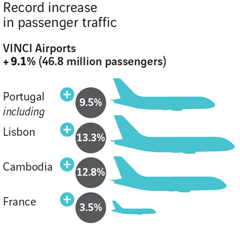
|
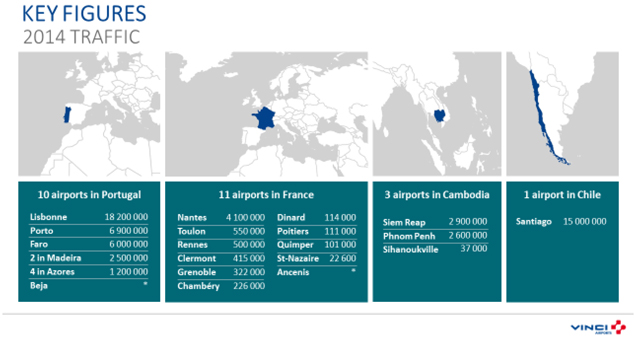
| *: |
general aviation in Beja and Ancenis airports |
14
OFFERING THE BEST POSSIBLE LEVEL OF SERVICE
VINCI Airports seeks to make its airports living areas, with innovative, useful, relevant passenger services developed through a good understanding of their
needs. The company also develop non-aeronautical activities, in partnership with retailers.
Non-aeronautical activities are an essential growth driver in
the face of the inevitable maturation of long-term traffic. For example, VINCI Airports has chosen to male available free and unlimited wifi in all its airports. Survey results indicated that access to wifi is one of leading expectations of
passengers.
For retailers, VINCI Airports works to provide attractive spaces, well-integrated into the overall passenger itinerary to maximize visibility
and leave free time for travelers. The company’s specialized non-aeronautical marketing teams work with distributors, including by providing advance data on flights and passenger segmentation.
VINCI Airports ensures that its contracts include competitive and attractive pricing for passengers to ensure harmonious and sustainable retail development
within its airports. For example, in Lisbon airport, the retail activity increased by 27% in 2014.
A TECHNICAL EXPERTISE IN PROJECT MANAGEMENT
In terms of project management, VINCI Airports’ expertise comes first from its detailed operational knowledge of an airport’s daily
operations.
In Tajikistan, VINCI Airports was asked by the governments of France and Tajikistan to assist with project management in the building of a
new 12,000 square meters international terminal for Dushanbe airports, with a capacity of 1.5 million passengers. The work was carried out by VINCI Construction Grands Projets. A team of experts from airports in France and Portugal conducted
the Operational Readiness and Airport Transfer process, consisting of training and operational testing prior to turning over the airport to the client.
VINCI Airports is about to finish the work to expand Phnom Penh and Siem Reap airports to accommodate 2.5 to 5 million passengers each by 2016. This
100 million dollars project is being constructed by VINCI Construction Grands Projets, with a strong safety commitment on the site and precise phasing of the work. The capacity of all aspects of the facilities will be strengthened.
In Chile, the works to double the capacity of the airport: from 15 million to 30 million passengers will also be carried out by VINCI Construction
Grands Projets.
VINCI Airports can count on the VINCI Group’s construction expertise through its subsidiaries Freyssinet, Ménard, etc.
http://jp.vinci-airports.com/
Twitter: @VINCIAirports
15
Orix (NYSE:IX)
Historical Stock Chart
From Mar 2024 to Apr 2024

Orix (NYSE:IX)
Historical Stock Chart
From Apr 2023 to Apr 2024
